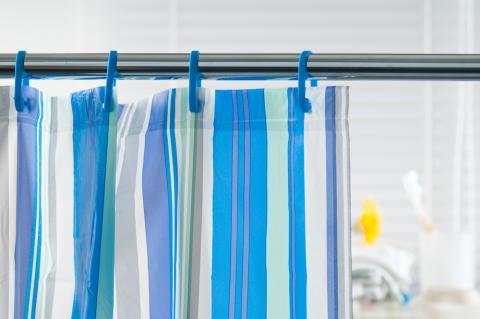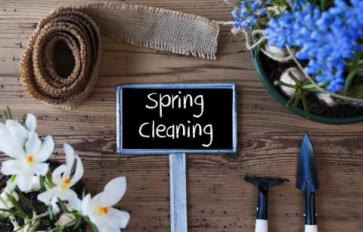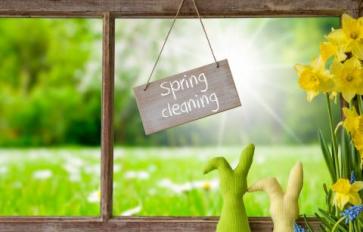
The other day while out shopping with my mom, I spotted a warning on a shower curtain case. It basically said the materials the shower curtain was made from were toxic and linked to cancer and hormone disrupters. I had to do a double take. Did they really just admit to such a thing and then still deem it worthy to put on store shelves? I was totally blown away. It leads me to ask—are shower curtains toxic? The short answer is yes, but here's why and what you need to know.
What are shower curtains made out of?
First and foremost, knowing what shower curtains are (most commonly) made from is important. Most are made from polyvinyl chloride (PVC), which contains a number of toxic chemicals. If it emits that “new shower curtain smell” you can be pretty sure it’s made with PVC.
This isn’t a good thing, that’s for sure. According to a study done by the Center for Health, Environment and Justice, new shower curtains released 108 volatile organic compounds (VOCs) into the air over 28 days, and after a week 40 VOCs were detected in the air. The number dropped to 16 after two weeks, 11 after three weeks and four after four weeks, but one thing is clear: the VOCs certainly lingered. To make matters worse, the study also found that over seven days, one new PVC shower curtain will release VOCs that exceed the indoor air quality guidelines established by the U.S. Green Building Council. Doesn’t exactly make you feel very safe now, does it?
It’s important to know how dangerous VOCs are to realize the weight of this study’s findings. VOCs may cause damage to the central nervous system, liver, and kidneys. They can also cause respiratory irritation, nausea, headaches, and a lack of coordination. Most commonly though, exposure to VOCs causes eye irritation, breathing problems, allergic skin reactions, headaches, fatigue, nose and throat discomfort, nausea, dizziness, nosebleeds, and even vomiting. In other words, exposure to VOCs is just plain bad for your overall health and not worth the risk.
There‘s also another reason to avoid these shower curtains: They harm the environment. You don‘t keep them for very long (and who would want to, knowing they‘re so toxic?) so they go to a landfill. There, they stick around for a very long time, since plastic does not decompose the same way organic matter does. In fact, they leach the toxins into the environment, polluting it.
Is this what we want to support? It’s bad enough the average American produces 4.4 pounds of trash per day as it is. Cutting back on waste wherever we can is a great idea, especially if it means it will benefit our health in the long run. Personally, I live a zero waste lifestyle so I'm always looking f or ways to avoid plastic as much as possible.
The Solution: Avoid PVC Shower Curtains
The best choice for your health and the environment? Stop buying PVC curtains. Instead, consider switching to cloth curtains or a glass shower door (if you can install one). You can wash a cloth curtain and reuse it as many times as you like. However, if you‘re truly worried you won‘t be able to keep up with washing it, at least make a vow to avoid PVC curtains. Look for PVC-free curtains instead. A number of large retailers are starting to offer these options in store.
Personally, my mom just bought a cloth shower curtain and we‘ve been using an old plastic liner (PVC-free) with it. So far, so good. We have no complaints, and the cloth curtain looks a lot nicer anyway. It’s not a perfect solution. but it helps cut back on some plastic waste at least. And we know we aren‘t inviting VOCs into our bathroom now, which is a huge plus. I‘d like to get rid of the plastic shower liner altogether honestly, but my mom is worried if the cloth curtain gets wet, mold will start growing. So, for now, it stays.
PVC-Free Shower Curtain Options
- Hemp: Definitely the priciest option, but it’s completely non-toxic and often grown without any pesticides. Fairly water resistant, but it will absorb water and need to dry out before being used again. Hemp curtains are machine washable in case stains develop. Keep the curtain as dry as possible to avoid any mold. You can compost it at the end of its life, too.
- Cotton: Similar to hemp, a cotton curtain can be machine washed and composted at the end of its life. However, it is less pricy than hemp shower curtains. Be careful though, as it is a bit more likely to grow mold than a hemp shower curtain. Do your best to let it dry after use. It should be composted after use (if it’s straight-up cotton and not combined with any other materials).
- Nylon: In terms of fabric type, nylon falls between PEVA and cotton/hemp. It’s not quite as waterproof as plastic, but it also doesn’t absorb water like cotton does. In other words, it’s definitely water resistant, but you’re more likely to have mold forming. Still, you’re subject to less chemicals than with PVC or PEVA curtains. Nylon curtains are also fairly cost effective compared to cotton or hemp curtains. That said, nylon’s not fully free of chemicals (it usually contains some of the chemicals PEVA does to aid in water resistance), so keep that in mind.
- PEVA: This material is an alternative to PVC that excludes the harmful polyvinyl chloride. It’s definitely a safer option and less toxic without changing the effectiveness too much. Unfortunately, it does still include other chemicals in it, but the toxicity is reduced. It’s definitely more waterproof and mold resistant than cotton and hemp curtains. That, and it’s the cheapest option available.
The truth is, cotton and hemp shower curtains are the best options if you want to avoid risking any toxicity. That said, they do require more upkeep, unlike typical shower curtains, so there are pros and cons to both sides. Choose wisely and remember to think about the health of your family (and the environment) in your next purchase.
Also, as a friendly reminder, PVC shower curtains aren‘t the only toxic products that could be lurking in your home. Here are four endocrine disruptors to avoid that are probably hiding in your home at this very moment.
Will you be purchasing a new shower curtain today?








